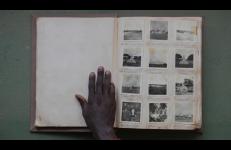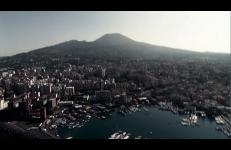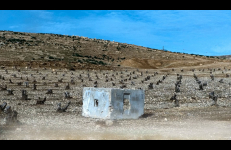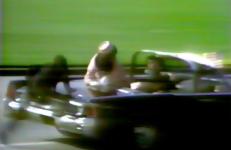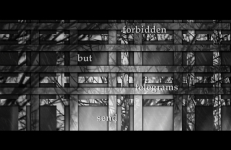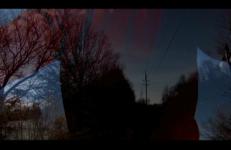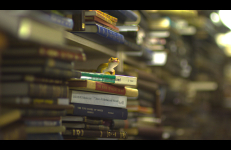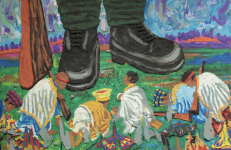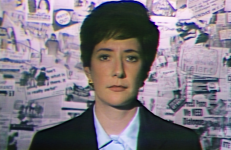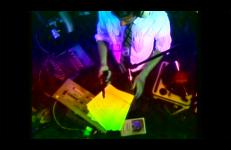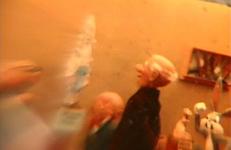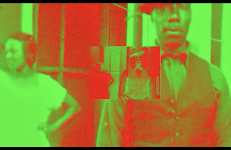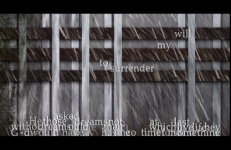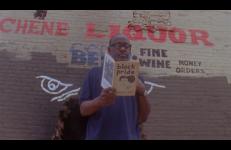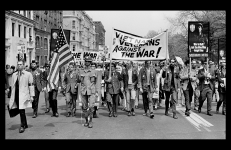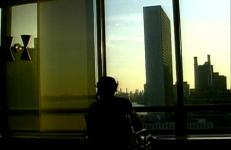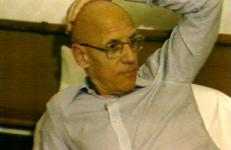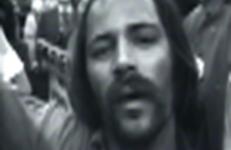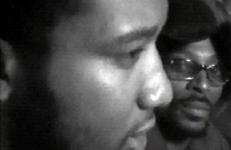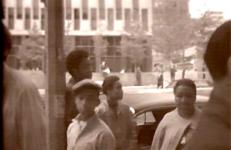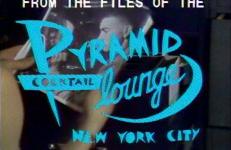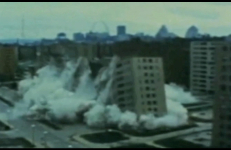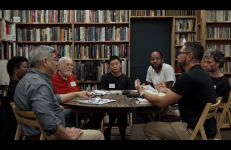The Embassy deals with the codes of representation used by the former Portuguese colonial power over the West African country Guinea-Bissau, and with modes of memory production. It shows a photo album depicting the perspective of the Portuguese colonist, who photographed with documentary diligence landscapes, people, architecture and monuments in Guinea-Bissau in the 1940s and 1950s.
History
"Living on the slopes of the volcano Vesuvius is a strange contradiction: always in stress and yet also sleepy, waiting for what might happen. In close cooperation with the Osservatorio Vesuviano and several inhabitants of the 'Red Zone' of the volcano, Rosa Barba constructs a lyrical portrait of this area, which shelters Mafia members and illegal Chinese immigrants. Historic footage, measurements, maps, and aerial shots try to capture what is always uncertain."
The project presents the blurring of the Green Line for Israelis and its consolidation for Palestinians, through important planning and legal decisions.
Irreverent yet poignant, The Eternal Frame is a re-enactment of the assassination of John F. Kennedy as seen in the famous Zapruder film. This home movie was immediately confiscated by the FBI, yet found its way into the visual subconscious of the nation. The Eternal Frame concentrates on this event as a crucial site of fascination and repression in the American mindset.
"The intent of this work was to examine and demystify the notion of the presidency, particularly Kennedy, as image archetype...."
— Doug Hall, 1984
Irreverent yet poignant, The Eternal Frame is a re-enactment of the assassination of John F. Kennedy as seen in the famous Zapruder film. This home movie was immediately confiscated by the FBI, yet found its way into the visual subconscious of the nation. The Eternal Frame concentrates on this event as a crucial site of fascination and repression in the American mindset.
"The intent of this work was to examine and demystify the notion of the presidency, particularly Kennedy, as image archetype...."
— Doug Hall, 1984
Irreverent yet poignant, The Eternal Frame is a re-enactment of the assassination of John F. Kennedy as seen in the famous Zapruder film. This home movie was immediately confiscated by the FBI, yet found its way into the visual subconscious of the nation. The Eternal Frame concentrates on this event as a crucial site of fascination and repression in the American mindset.
"The intent of this work was to examine and demystify the notion of the presidency, particularly Kennedy, as image archetype...."
— Doug Hall, 1984
At the computer, I cut video threads of wind storms and quaking trees. I create a companion piece for Florence called Etty using the words of a young woman from completely different circumstances who transcends fear and resists terror in the midst of extreme circumstances. Etty Hillesum was a 29 year old Dutch writer we know only from her diaries first published in the early 1980s.
A woman recounts her story of the mass exodus of Palestinians from Jerusalem. Beginning with the arrival and ending with the departure, the tale moves backwards in time and through various landscapes. The events are neither undone nor is the story untold; instead, Farther than the eye can see traces a decaying experience to a place that no longer exists.
Based on live testimony, historical documents from my Egyptian Jewish family’s archives, and fragments from the renowned Cairo Geniza discovered in the 19th century in the Ben Ezra synagogue in Cairo, which includes documents from the 9th-19th centuries. Fatherland Archives illuminates the vanished world of Egyptian Jewish life and culture.
Inspired by an unaccomplished personal project, in this animation, I’m exploring ideas of intention, extension, and failed romanticism. I used images and texts from mass-produced postcards, packaging, calendar booklets, books, posters, and pamphlets that were created and used as political propaganda devices for the invasion of Ethiopia by Fascist Italy during WWII. Some of these prints were on the front covers of school notebooks, some were games that taught the geography, history, and natural resources of Ethiopia.
Broadcasters across Ireland and Britain have entered into a blackout strike. The workers are transmitting a programme bringing censored voices back onto the airwaves.
"In the late 1980s, as violence continues in the north of Ireland, censorship is increasingly being enforced on British and Irish television. In response, broadcasters have entered into a blackout strike, occupying several stations and transmitting a programme bringing censored voices back onto the airwaves."
"On January 22, 1987 an unjustly convicted Budd Dwyer grasped onto the pages of his final speech as Pennsylvania's State Treasurer before shooting himself in front of news cameras. Our current year of armageddon, recession, and occupation resonates as a fitting time to step into Budd's shoes (and perhaps others who sought freedom the same way.) I set up a mini news conference with antiquated, glitchy analog cameras, mixers, players, and decks with the goal of recording Budd's speech in one take.
I just got this tattoo — you can see it's still healing, the edges are raised like some sort of fancy business card — to mark the completion of this, Series One of my on-going project, Final Thoughts. So, on one wrist, facing fistward, a skull and, on the other, still tender and healing, a ghost. Let them be the mascots for the series, little cartoony avatars.
In this 23-minute single-channel video, Campbell reconfigures scenes from archival 16mm film footage recorded by Solomon Sir Jones in the mid-1920s, film that documents the everyday lives of Black communities in Oklahoma, an area that once boasted over fifty Black townships during Reconstruction. The film documents Black self-determination in light of the erasure and displacement of Black communities across the United States, such as the Greenwood District in Tulsa Oklahoma—the site of the 1921 Tulsa Race Massacre, that persists today.
I sit at my computer cutting up real time footage of waterfalls, snow storms, boiling water. I combine these to make threads of moving images. I look and listen to the result in front of me and I think of people whose actions transcend fear—not in a momentary instinctual way—but over a sustained period of time. The name Florence Nightingale comes to mind, a woman whose name has become a cliche but of whom I know so little. I order books of her writings from Amazon and select phrases spread over hundreds of pages to make a soliloquy or poem. We collaborate.
Fluid Frontiers is the fifth and final film in the series entitled The Diaspora Suite, exploring Asili’s personal relationship to the African Diaspora. Shot along the Detroit River, Fluid Frontiers explores the relationship between concepts of resistance and liberation, exemplified by the Underground Railroad, Broadside Press, and artworks of local Detroit Artists.
A film for high school students and their teachers about the history of the Viet Nam War, composed of just photographs from that war, narration and, to help us through a damned disheartening story, lots of the Bach Suite for Solo Cello #1 in G.
To read the accompanying curriculum guide click here.
This installation is based on the re-enactment of Franz Kafka’s allegory "Before the Law", interpreted live over a telephone line by Katharine Gun. Gun was a translator (specializing in Chinese to English translations), working with the British secret service, who chose to leak information compromising the U.S. and U.K. governments in their push for a U.N. resolution for the invasion of Iraq.
Michel Foucault was one of the most influential philosophers and cultural historians of the 20th Century, reconceiving power and identities as historically specific social relations and discourses. His studies challenged the works of Marx and Freud, offering new understandings of institutional practices and their effects on the human body and psyche in his studies of prisons, mental illness, medicine, and sexuality.
TVTV's inside view of the 1972 Republican National Convention made broadcast history. While network cameras focused on the orchestrated renomination of Richard Nixon, TVTV's rag-tag army of guerrilla television activists turned their cameras on to the cocktail parties, anti-war demonstrations, hype and hoopla that accompanied the show.
The Videofreex conducted this interview with Fred Hampton, the Deputy Chairman of the Illinois chapter of the Black Panther Party, in October 1969, just over a month before he was killed by the Chicago police.
Rare footage of a September 1970 rally honoring the late Fred Hampton, Deputy Chairman of the Illinois chapter of the Black Panther Party. One of the speakers leads the audience in a call and response.
From The Files of the Pyramid Cocktail Lounge is a series of video clips taken at the Pyramid Club, a seminal location for the East Village drag scene in the midst of the club's most influential years. While rummaging through a file cabinet full of event fliers from the Pyramid Club, an office worker in drag guides the viewer through video documentation of past performances at the club.
Futures for Failures is a double narrative of failure: architectural and social. Archival footage from a demolition of the Pruitt-Igoe building in St. Louis manifests as the materialization of modernity’s failure. Meanwhile, an intimate voiceover recounts a moment of laughter erupting during a stranger’s funeral, staging anachronous conversation between the disappeared and the disappearing.
Seven homosexuals, ages ranging 28-85, and strangers to one another, convene in a Los Angeles bookstore. The following unscripted conversation is facilitated by the filmmaker in collaboration with community organizer, founding member of the Radical Faeries, and Jungian psychologist, Dr. Don Kilhefner, and explores community, organizing, identity and intersectionality. Gay Men's Book Club is an intergenerational portrait of a community and the social dynamics found within informal learning environments.




